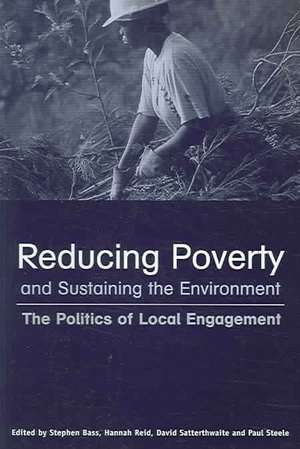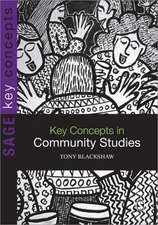Reducing Poverty and Sustaining the Environment: The Politics of Local Engagement
Editat de David Satterthwaite, Hannah Reid, Stephen Bassen Limba Engleză Paperback – 3 aug 2005
Preț: 274.33 lei
Preț vechi: 342.52 lei
-20% Nou
Puncte Express: 411
Preț estimativ în valută:
52.50€ • 54.61$ • 43.34£
52.50€ • 54.61$ • 43.34£
Carte tipărită la comandă
Livrare economică 14-28 aprilie
Preluare comenzi: 021 569.72.76
Specificații
ISBN-13: 9781844071166
ISBN-10: 1844071162
Pagini: 344
Dimensiuni: 156 x 234 x 19 mm
Greutate: 0.54 kg
Ediția:1
Editura: Taylor & Francis
Colecția Routledge
Locul publicării:Oxford, United Kingdom
ISBN-10: 1844071162
Pagini: 344
Dimensiuni: 156 x 234 x 19 mm
Greutate: 0.54 kg
Ediția:1
Editura: Taylor & Francis
Colecția Routledge
Locul publicării:Oxford, United Kingdom
Cuprins
Introduction * The focus of this book * The case studies: Political change in Africa, Asia and Latin America and the Caribbean * Mapping power relationships * What do we mean by poverty? * How political change can support pro-poor environmental outcomes * Part I, Creating Space for Civil Society in an Impoverished Environment in Pakistan * AKRSP's approach: 'Social organization' tackles poverty and natural resource degradation * Improving governance: AKRSP as a complement to government, not a substitute * Maturing institutions get to grips with environmental issues and influence policy * Influencing national policy on rural development * Part II, The Bioplan: Decreasing Poverty in Manizales, Colombia, through Shared Environmental Management * The context: Urban and rural poverty in Colombia and Manizales * The Bioplan in action * Experiences * Part III, Environment-Poverty Linkages: Managing Natural Resources in China * Improving environment-poverty projects * Participatory assessments * Poverty reduction, environment and participation * Part IV, The Evolving Roles of Environmental Management Institutions in East Africa: From Conservation to Poverty Reduction * Some reflections on governance in the context of the East African Community * Current trends in governance * National environmental governance in the context of poverty eradication * Looking to the future * Part V, Stories on the Environment and Conflict from Northern Nigeria * The Hadejia-Nguru Wetlands * Bringing the stories together * Part VI, The Sea is our Garden: Coastal Resource Management and Local Governance in the Caribbean * A small island and its internal politics * The case study: Context and stakeholders * Promoting sustainable coastal livelihoods * Lessons learned: Local governance and institutional arrangements for coastal conservation and management * Part VII'Working for Water' in a Democratic South Africa * What is 'Working for Water'? * The political environment: Time for action * Is everything rosy? * Outcomes * Part VIII, People, Perspectives and Reality: Usangu Myths and Other Stories, Tanzania * Prologue: The stage is set, the actors announced * Act 1: The players reveal their agendas; international, national and local stages are revealed * Act 2: A circle of blame in Usangu benefits a collusion of interests * Act 3: Misleading answers in a climate of self-interest * Finale * Part IX, Community-designed, built and managed Toilet Blocks in Indian Cities * The inadequacies in providing sanitation * What people wanted and what they could do themselves * The community toilet programme in Pune * New opportunities for community toilets in Mumbai * Innovations in community toilets * Why did the alliance take on community toilet blocks? * The art of gentle negotiation * Community toilets add to the poor's repertoire * Part X, Concertaci�n (Reaching Agreement) and Planning for Sustainable Development in Ilo, Peru * The birth of the experience * The achievements, 1980-2003 * The coordinating agency and stages in the process * Tangible results * The current situation * Factors that favour the process of reaching agreement * Limitations of the experience * Conclusions * Context: The political underpinnings of poverty and environmental degradation * How political changes have achieved pro-poor environmental outcomes * How donors must change the way they do
Notă biografică
Stephen Bass is Head of Environment at DFID and co-author of Policy that Works for People (2004) and The Sustainable Forestry Handbook (2004). Hannah Reid is a Research Associate at IIED. David Satterthwaite is a Senior Fellow at IIED, co-author of Empowering Squatter Citizen (2004) and winner of the 2004 Volvo Environment Prize. Paul Steele is an environmental economist focusing on political analysis and currently based in Sri Lanka. Published with IIED









